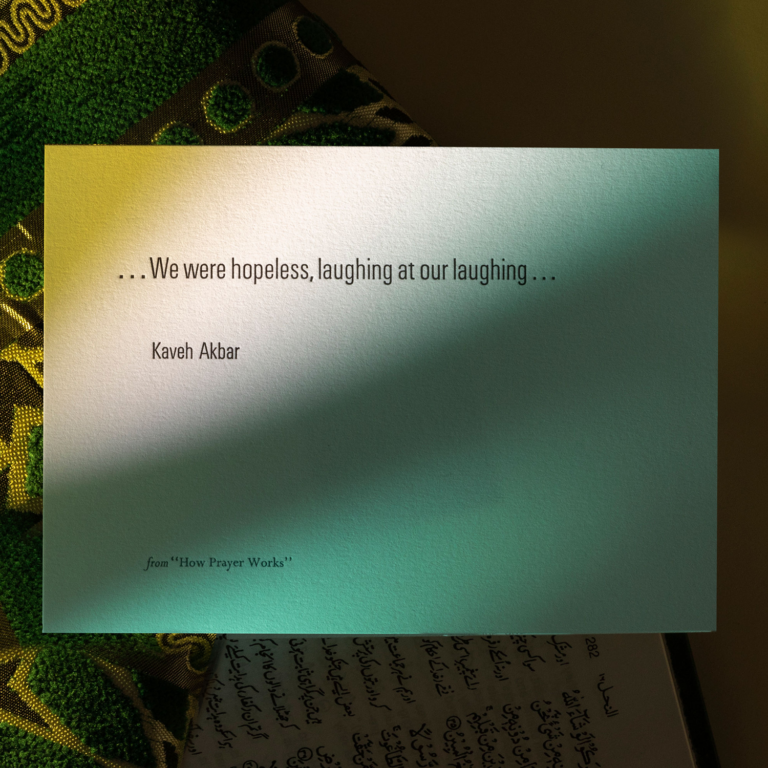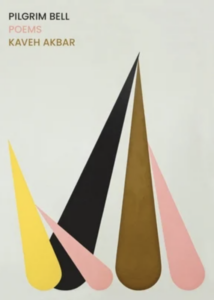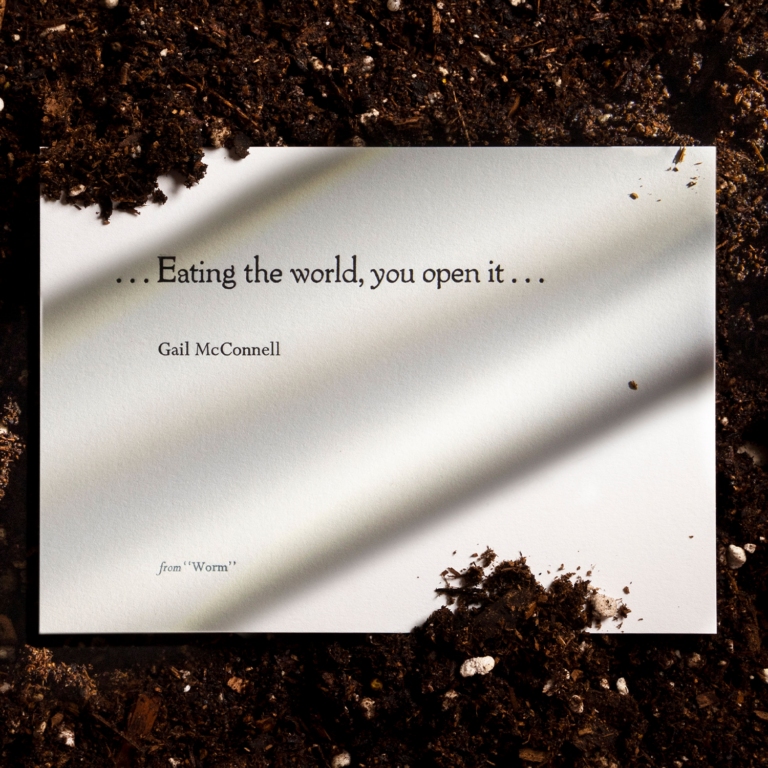Kaveh Akbar
How Prayer Works
A narrative prose poem about two brothers — one on a visit home from college — who are turning to face east in their small shared room. With seven years between them, one is a young man and the other, the poet, is nearing his teens. Their prayer is interrupted by a sudden surprising noise, and the sound of this makes them fall over each other in laughing. Their bodies, their joy, their uncontrollable delight is the prayer of their own lives.

Letterpress prints by Myrna Keliher | Photography by Lucero Torres
Guest

Kaveh Akbar is an Iranian-American poet and scholar. He is the author of Pilgrim Bell, Calling a Wolf a Wolf, and the chapbook, Portrait of the Alcoholic. His poems appear in The New Yorker, The New York Times, Paris Review, Best American Poetry, and elsewhere. In 2020, Kaveh was named Poetry Editor of The Nation.
Transcript
Pádraig Ó Tuama: My name is Pádraig Ó Tuama, and one of the things that poetry is, is that it’s concise. It’s quite tight. There’s a lot left out. There’s a lot of empty space on the page. And so as a result, a funny poem, I think, is often even funnier, because it’s not giving a lot of extra detail. It’s just telling you what you need to know.
One time, I was in a bookshop, and I picked down a poetry book and started to read a random poem in it, and burst out laughing in this very solemn bookshop. And I didn’t know what to do, so I bought the book and left. I still have the book, and I love it.
[music: “Praise the Rain” by Gautam Srikishan]
“How Prayer Works” by Kaveh Akbar:
“Tucked away in our tiny bedroom so near each other
the edge of my prayer rug covered the edge of his, my
brother and I prayed. We were 18 and 11 maybe, or 19
and 12. He was back from college where he built his own
computer and girls kissed him on the mouth. I was barely
anything, just wanted to be left alone to read and watch
The Simpsons.
We prayed together as we had done thousands of times,
rushing ablutions over the sink, laying our janamazes out
toward the window facing the elm which one summer
held an actual crow’s nest full of baby crows: fuzzy, black-
beaked fruit, they were miracles we did not think to
treasure.
My brother and I hurried through sloppy postures of
praise, quiet as the light pooling around us. The room
was so small the twin bed took up nearly all of it, and
as my brother, tall and endless, moved to kneel, his foot
caught the coiled brass doorstop, which issued forth a
loud brooong. The noise crashed around the room like a
long, wet bullet shredding through porcelain.
My brother bit back a smirk and I tried to stifle a snort
but solemnity ignored our pleas—we erupted, laughter
quaking out our faces into our bodies and through the
floor. We were hopeless, laughing at our laughing, our
glee an infinite rope fraying off in every direction.
It’s not that we forgot God or the martyrs or the Prophet’s
holy word—quite the opposite, in fact, we were boys built
to love what was in front of our faces: my brother and I
on the floor draped across each other, laughing tears into
our prayer rugs.”
[music: “Outstretched Hand” by Gautam Srikishan]
This poem of Kaveh Akbar comes from a book called Pilgrim Bell. And there are six poems named “Pilgrim Bell” in the book. And even in the poems not named that, there’s a sound of a bell that echoes throughout a whole variety of the poems, like this one. And so the book itself is a kind of a call to prayer and a call to attention.
Kaveh Akbar often writes poems that are filled with a recognition of the brutality of the human experience and ways within which shortcomings and pain and prejudice come up. And this poem is being offered like a little balm, like a small drop of water, like something that is bringing great comfort to pilgrims, in the middle of so many of his poems that are so brilliantly insightful about the complexity of being human.
I love that line toward the end of it, when he’s defending this joyous experience that happens between himself and his brother. “It’s not that we forgot God or the martyrs or the Prophet’s holy word—quite the opposite, in fact, we were boys built to love what was in front of our faces.” And this poem holds the idea of prayer, which can often be an abstract one, with the physical sensation of what’s right in front of you, what’s happening, who’s right in front of you, how are you being with each other, what’s going on, how can you be drawn towards each other — and that that itself is the answer to prayer.
[music: “Glinting Giant” by Blue Dot Sessions]
So in this poem, you’ve got two brothers, 11 and 18, we hear, or maybe 12 and 19. I love the casual nature of saying “can’t quite exactly remember what age I was,” but knowing, of course, that there’s seven years’ distance. And you know, when one person’s about to become a teenager soon, and the other’s about to leave teenagerhood, that gap of seven years seems huge. You know, when those brothers are 48 and 55, those distances won’t seem so huge.
And even physically, at this age, they’re different. Kaveh Akbar says, “I was barely anything.” But his brother was “tall and endless.” So somehow, physically and in so many stages of life, they are so different to each other at that time. He wants to stay at home and watch The Simpsons. The brother is at college, making his own computers and being kissed on the mouth by girls.
And so the older brother is back now. And you can imagine, perhaps, that he might have said to his friends at college, “Oh, back home I share a bedroom with my little brother.” And you can perhaps consider that coming home to share a bedroom with your little brother, there’s a certain affection, as well as a certain renunciation of some of the freedoms that you’ve experienced at college, tucked into the small space where there’s barely enough room to move, barely enough room for twin beds, and certainly, there doesn’t seem to be much room for praying and everything that happens, without tumbling over each other regularly.
You can imagine that, for some people, they’d talk about that as a great imposition. But what’s lovely about this poem is that it speaks about this connection with such great affection. They’re draped over each other at the end. What an interesting verb to use, “drape” — draped like curtains, pieces of furniture in each other’s room, things that close out the light, or things that you can open and let the light in. There’s a great opening to each other, a great opening to light, in this. Their proximity with each other isn’t an interruption, it’s a door opening into joy.
[music: “Glinting Giant” by Blue Dot Sessions]
So these brothers are praying their prayers, and this interruption happens, the “brooong” of the coiled brass doorstop is rung, and it’s like a bell calling them to prayer. And they’re trying not to laugh, which of course is the best way to make yourself laugh even more. And solemnity, which is surely a thing of the mind, is kind of overcome by belly laughter and by the body and by everything that’s funny, even though — [laughs] it’s kind of curious to me, why is the sound of that doorstop funny?
And that’s part of the point, too, is that funny things aren’t always funny because of something particularly comic about it — it’s just the timing. It’s just the unexpected nature of it. It’s the fact that the two of them, perhaps, were wanting to reconnect. Who knows, there’s so many things that could’ve happened in that moment, that caused them to fall apart with laughter.
Their glee was “an infinite rope fraying off in every direction.” It’s a gorgeous image from prayer, and then a beautiful way to tie the idea of these divine bonds that link us in prayer, to ourselves and each other and God — that somehow prayer and laughter and this kind of glee, this interrupting glee, this very unholy kind of thing, is a holy thing in and of itself.
The parents are kind of absent from this poem, not in a way that they’re abandoned, but they’re not being present. Partly, I do think that that is a narration of a child, you know — you’re in your own world, even if your own world is your small room that you sometimes share with your older brother. There is devotion between these brothers. They’re saying their prayers. It feels like they’re in a home where prayers are being expected to be said, although they’re not being burdened with devotion; they’re being told, “You need to say your prayers,” and they’re rushing through it in the way they normally do. Prayer in this kind of imagination is like a favorite crumpled shirt you just throw on. There’s something so ordinary and domestic and everyday about it that, actually, it’s full of affection and full of kindness, and it’s just wrapped into the ordinariness of your life.
[music: “Idle Ways” by Blue Dot Sessions]
As I think about one of the ways that this poem opens up hospitality, it’s the title, “How Prayer Works.” And this poem is saying that, somehow, one of the possibilities in prayer is that it works by bringing us together. Of course, within the context of this, these two brothers are falling apart with laughter, and it’s wonderful. But it also does something in terms of inviting people to think that prayer is a human practice, that somehow the way we turn towards each other, as we turn toward Mecca, that that, too, is a way of paying attention to the fact that prayer can be a very secular, can be a very holy, can be a very inviting, can even be a very casual experience; that you don’t have to be too dressed-up in formalities in order to experience the very thing that prayer might be able to offer, which is being alongside each other.
But I also think that this poem is inviting us to think about prayer as practice, prayer being present in the body. This poem, towards the end, makes a deliberate defense of this delightful, delicious, everyday experience between these brothers: that they are not neglecting the holy word of God by erupting into laughter. And so what it’s saying is that their bodies are important and that the practice in the body is important.
The invitation in this poem is also linked to the title, because how prayer works — often, I suppose, you could think that prayer works by some divine intervention or something happening that you’d prayed for. But here, we see that these fellas are filled with mirth and glee and connection and experience with each other. Clearly, this is being narrated decades after it’s happened. But yet, it’s still there, still spreading joy. And that was the answer to the prayer that perhaps they weren’t asking for, but that’s how prayer showed up between them — that they themselves, in their joy, were the answers to the prayer that they were holding in their bodies.
[music: “Glinting Giant” by Blue Dot Sessions]
“How Prayer Works” by Kaveh Akbar:
“Tucked away in our tiny bedroom so near each other
the edge of my prayer rug covered the edge of his, my
brother and I prayed. We were 18 and 11 maybe, or 19
and 12. He was back from college where he built his own
computer and girls kissed him on the mouth. I was barely
anything, just wanted to be left alone to read and watch
The Simpsons.
We prayed together as we had done thousands of times,
rushing ablutions over the sink, laying our janamazes out
toward the window facing the elm which one summer
held an actual crow’s nest full of baby crows: fuzzy, black-
beaked fruit, they were miracles we did not think to
treasure.
My brother and I hurried through sloppy postures of
praise, quiet as the light pooling around us. The room
was so small the twin bed took up nearly all of it, and
as my brother, tall and endless, moved to kneel, his foot
caught the coiled brass doorstop, which issued forth a
loud brooong. The noise crashed around the room like a
long, wet bullet shredding through porcelain.
My brother bit back a smirk and I tried to stifle a snort
but solemnity ignored our pleas—we erupted, laughter
quaking out our faces into our bodies and through the
floor. We were hopeless, laughing at our laughing, our
glee an infinite rope fraying off in every direction.
It’s not that we forgot God or the martyrs or the Prophet’s
holy word—quite the opposite, in fact, we were boys built
to love what was in front of our faces: my brother and I
on the floor draped across each other, laughing tears into
our prayer rugs.”
[music: “Praise the Rain” by Gautam Srikishan]
Chris Heagle: “How Prayer Works” comes from Kaveh Akbar’s book Pilgrim Bell. Thank you to The Permissions Company on behalf of Greywolf Press, who gave us permission to use Kaveh’s poem. Read it on our website, at onbeing.org.
[music: “Praise the Rain” by Gautam Srikishan]
Poetry Unbound is: Gautam Srikishan, Erin Colasacco, Eddie Gonzalez, Lilian Vo, and me, Chris Heagle.
Our music is composed and provided by Gautam Srikishan and Blue Dot Sessions.
This podcast is produced by On Being Studios, which is located on Dakota land. We also produce other podcasts you might enjoy, like On Being with Krista Tippett, Becoming Wise, and This Movie Changed Me. Find those wherever you like to listen, or visit us at onbeing.org to find out more.
Books & Music
Recommended Reading
The On Being Project is an affiliate partner of Bookshop.org and Amazon.com. Any earnings we receive through these affiliate partnerships go into directly supporting The On Being Project.







